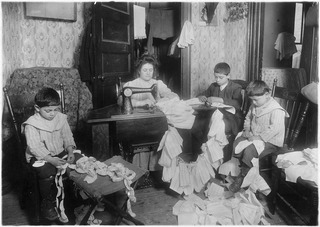
In the United States, Social Security is the commonly used term for the federal Old-Age, Survivors, and Disability Insurance (OASDI) program and is administered by the Social Security Administration (SSA). The Social Security Act was passed in 1935, and the existing version of the Act, as amended, encompasses several social welfare and social insurance programs.

The poverty threshold, poverty limit, poverty line, or breadline is the minimum level of income deemed adequate in a particular country. The poverty line is usually calculated by estimating the total cost of one year's worth of necessities for the average adult. The cost of housing, such as the rent for an apartment, usually makes up the largest proportion of this estimate, so economists track the real estate market and other housing cost indicators as a major influence on the poverty line. Individual factors are often used to account for various circumstances, such as whether one is a parent, elderly, a child, married, etc. The poverty threshold may be adjusted annually. In practice, like the definition of poverty, the official or common understanding of the poverty line is significantly higher in developed countries than in developing countries.

National Insurance (NI) is a fundamental component of the welfare state in the United Kingdom. It acts as a form of social security, since payment of NI contributions establishes entitlement to certain state benefits for workers and their families.

A wage is payment made by an employer to an employee for work done in a specific period of time. Some examples of wage payments include compensatory payments such as minimum wage, prevailing wage, and yearly bonuses, and remunerative payments such as prizes and tip payouts. Wages are part of the expenses that are involved in running a business. It is an obligation to the employee regardless of the profitability of the company.

A living wage is defined as the minimum income necessary for a worker to meet their basic needs. This is not the same as a subsistence wage, which refers to a biological minimum, or a solidarity wage, which refers to a minimum wage tracking labor productivity. Needs are defined to include food, housing, and other essential needs such as clothing. The goal of a living wage is to allow a worker to afford a basic but decent standard of living through employment without government subsidies. Due to the flexible nature of the term "needs", there is not one universally accepted measure of what a living wage is and as such it varies by location and household type. A related concept is that of a family wage – one sufficient to not only support oneself, but also to raise a family.
A disability pension is a form of pension given to those people who are permanently or temporarily unable to work due to a disability.

A salary is a form of periodic payment from an employer to an employee, which may be specified in an employment contract. It is contrasted with piece wages, where each job, hour or other unit is paid separately, rather than on a periodic basis. Salary can also be considered as the cost of hiring and keeping human resources for corporate operations, and is hence referred to as personnel expense or salary expense. In accounting, salaries are recorded in payroll accounts.

The working poor are working people whose incomes fall below a given poverty line due to low-income jobs and low familial household income. These are people who spend at least 27 weeks in a year working or looking for employment, but remain under the poverty threshold.

The National Minimum Wage Act 1998 creates a minimum wage across the United Kingdom. From 1 April 2024, the minimum wage is £11.44 for people aged 21 and over, £8.60 for 18- to 20-year-olds, and £6.40 for 16- to 17-year-olds and apprentices.
Poverty in the entirety of Australia refers to the incidence of relative poverty in Australia and its measurement. Relative income poverty is measured as the percentage of the population that earns less than the median wage of the working population.

Piece work or piecework is any type of employment in which a worker is paid a fixed piece rate for each unit produced or action performed, regardless of time.
The term in kind generally refers to goods, services, and transactions not involving money or not measured in monetary terms. It is a part of many spheres, mainly economics, finance, but also politics, work career, food, health and others. There are many different types of in kind actions throughout the mentioned branches, which can be identified and distinguished.

Poverty in the United Kingdom is the condition experienced by the portion of the population of the United Kingdom that lacks adequate financial resources for a certain standard of living, as defined under the various measures of poverty.

Median household disposable income in the UK was £29,400 in the financial year ending (FYE) 2019, up 1.4% (£400) compared with growth over recent years; median income grew by an average of 0.7% per year between FYE 2017 and FYE 2019, compared with 2.8% between FYE 2013 and FYE 2017.
The welfare trap theory asserts that taxation and welfare systems can jointly contribute to keep people on social insurance because the withdrawal of means-tested benefits that comes with entering low-paid work causes there to be no significant increase in total income. According to this theory, an individual sees that the opportunity cost of getting a better paying job is too great for too little a financial return, and this can create a perverse incentive to not pursue a better paying job.
European labour law regulates basic transnational standards of employment and partnership at work in the European Union and countries adhering to the European Convention on Human Rights. In setting regulatory floors to competition for job-creating investment within the Union, and in promoting a degree of employee consultation in the workplace, European labour law is viewed as a pillar of the "European social model". Despite wide variation in employment protection and related welfare provision between member states, a contrast is typically drawn with conditions in the United States.
The Resolution Foundation is an independent British think tank established in 2005. Its stated aim is to improve the standard of living of low-to-middle income families.
The National Living Wage is an obligatory minimum wage payable to workers in the United Kingdom aged 21 and over which came into effect on 1 April 2016. As of April 2024 it is £11.44 per hour. It was implemented at a significantly higher rate than the national minimum wage rate for workers under 25, and was expected to rise to at least £9 per hour by 2020. The consultation document issued by the Low Pay Commission in 2019 indicated that this target would not be met, instead proposing a figure of £8.67 per hour for the over 23 rate. The target figure of £9 per hour was not reached until 2022.

The Living Wage Foundation is a campaigning organisation in the United Kingdom which aims to persuade employers to pay a living wage. The organisation was established in 2011; it publishes an annual Living Wage figure and for a fee accredits employers who pay at the rate of the "living wage".
The Minimum Income Standard (MIS) is a research method developed in the UK, and now applied in other countries, to identify what incomes different types of households require to reach a socially acceptable living standard. The term has also been used to describe political criteria used openly or implicitly by some governments to assess the adequacy of income levels. MIS is the basis for the calculation of the UK living wage.











